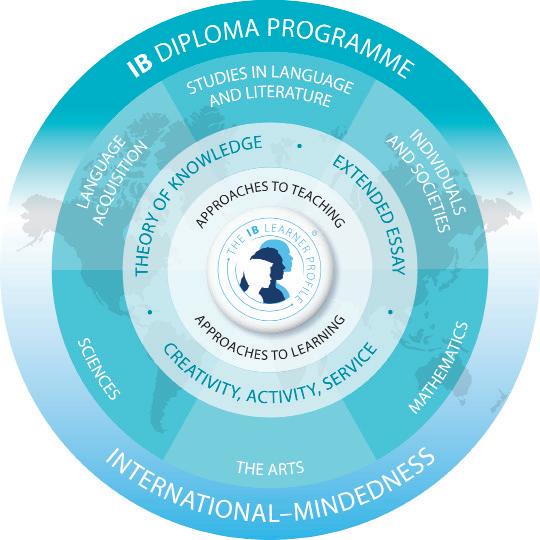Sciences: Biology
First assessment 2025
The Diploma Programme (DP) is a rigorous pre-university course of study designed for students in the 16 to 19 age range. It is a broad-based two-year course that aims to encourage students to be knowledgeable and inquiring, but also caring and compassionate. There is a strong emphasis on encouraging students to develop intercultural understanding, open-mindedness, and the attitudes necessary for them to respect and evaluate a range of points of view.
The course is presented as six academic areas enclosing a central core. Students study two modern languages (or a modern language and a classical language), a humanities or social science subject, an experimental science, mathematics and one of the creative arts. Instead of an arts subject, students can choose two subjects from another area. It is this comprehensive range of subjects that makes the Diploma Programme a demanding course of study designed to prepare students effectively for university entrance. In each of the academic areas students have flexibility in making their choices, which means they can choose subjects that particularly interest them and that they may wish to study further at university. Normally, three subjects (and not more than four) are taken at higher level (HL), and the others are taken at standard level (SL). The IB recommends 240 teaching hours for HL subjects and 150 hours for SL. Subjects at HL are studied in greater depth and breadth than at SL. In addition, three core elements—the extended essay, theory of knowledge and creativity, activity, service—are compulsory and central to the philosophy of the programme.

I. Course description and aims
As one of the three natural sciences in the IB Diploma Programme, biology is primarily concerned with the study of life and living systems. Biologists attempt to make sense of the world through a variety of approaches and techniques, controlled experimentation and collaboration between scientists. At a time of global introspection on human activities and their impact on the world around us, developing and communicating a clear understanding of the living world has never been of greater importance than it is today.
Through the study of DP biology, students are empowered to make sense of living systems through unifying themes. By providing opportunities for students to explore conceptual frameworks, they are better able to develop understanding and awareness of the living world around them. This is carried further through a study of interactions at different levels of biological organization, from molecules and cells to ecosystems and the biosphere. Integral to the student experience of the DP biology course is the learning that takes place through scientific inquiry. With an emphasis on experimental work, teachers provide students with opportunities to ask questions, design experiments, collect and analyse data, collaborate with peers, and reflect, evaluate and communicate their findings.
DP biology enables students to constructively engage with topical scientific issues. Students examine scientific knowledge claims in a real-world context, fostering interest and curiosity. By exploring the subject, they develop understandings, skills and techniques which can be applied across their studies and beyond.

Through the overarching theme of the nature of science, the course aims to enable students to:
1. develop conceptual understanding that allows connections to be made between different areas of the subject, and to other DP sciences subjects
2. acquire and apply a body of knowledge, methods, tools and techniques that characterize science
3. develop the ability to analyse, evaluate and synthesize scientific information and claims
4. develop the ability to approach unfamiliar situations with creativity and resilience
5. design and model solutions to local and global problems in a scientific context
6. develop an appreciation of the possibilities and limitations of science
7. develop technology skills in a scientific context
8. develop the ability to communicate and collaborate effectively
9. develop awareness of the ethical, environmental, economic, cultural and social impact of science.
II.Curriculum model overview
The DP biology course promotes concept-based teaching and learning to foster critical thinking.
The DP biology course is built on:
• approaches to learning
• nature of science
• skills in the study of biology.
These three pillars support a broad and balanced experimental programme. As students progress through the course, they become familiar with traditional experimentation techniques, as well as the application of technology. These opportunities help them to develop their investigative skills and evaluate the impact of error and uncertainty in scientific inquiry. The scientific investigation then places a specific emphasis on inquiry-based skills and the formal communication of scientific knowledge. Finally, the collaborative sciences project extends the development of scientific communication in a collaborative and interdisciplinary context, allowing students to work together beyond the confines of biology.
•
•
•
•
•
•
•
•
•
•
•
•
•
•
•
•
•
•
•
•
•
•
•
*Topics with content that should only be taught to HL students
Skills in the study of biology
The skills and techniques students must experience through the course are encompassed within the tools. These support the application and development of the inquiry process in the delivery of the biology course.
Tools
• Experimental techniques
• Technology
• Mathematics
Inquiry process
• Exploring and designing
• Collecting and processing data
• Concluding and evaluating
Teachers are encouraged to provide opportunities for students to encounter and practise the skills throughout the programme. Rather than being taught as stand-alone topics, these skills should be integrated into the teaching of the syllabus when they are relevant to the syllabus topics being covered.
III.Assessment model
There are four assessment objectives for the DP biology course. Having followed the biology course, students are expected to demonstrate the following assessment objectives.
Assessment objective 1
Demonstrate knowledge of:
• terminology, facts and concepts
• skills, techniques and methodologies.
Assessment objective 2
Understand and apply knowledge of:
• terminology and concepts
• skills, techniques and methodologies.
Assessment objective 3
Analyse, evaluate, and synthesize:
• experimental procedures
• primary and secondary data
• trends, patterns and predictions.
Assessment objective 4
Demonstrate the application of skills necessary to carry out insightful and ethical investigations.
Assessment at a glance
About the IB: For over 50 years, the IB has built a reputation for high-quality, challenging programmes of education that develop internationally minded young people who are well prepared for the challenges of life in the 21st century and are able to contribute to creating a better, more peaceful world.
For further information on the IB Diploma Programme, visit: www.ibo.org/en/dp.
Complete subject guides can be accessed through the programme resource centre or purchased through the IB store: https://www.follettibstore.com .
For more on how the DP prepares students for success at university, visit: www.ibo.org/en/university-admission.
